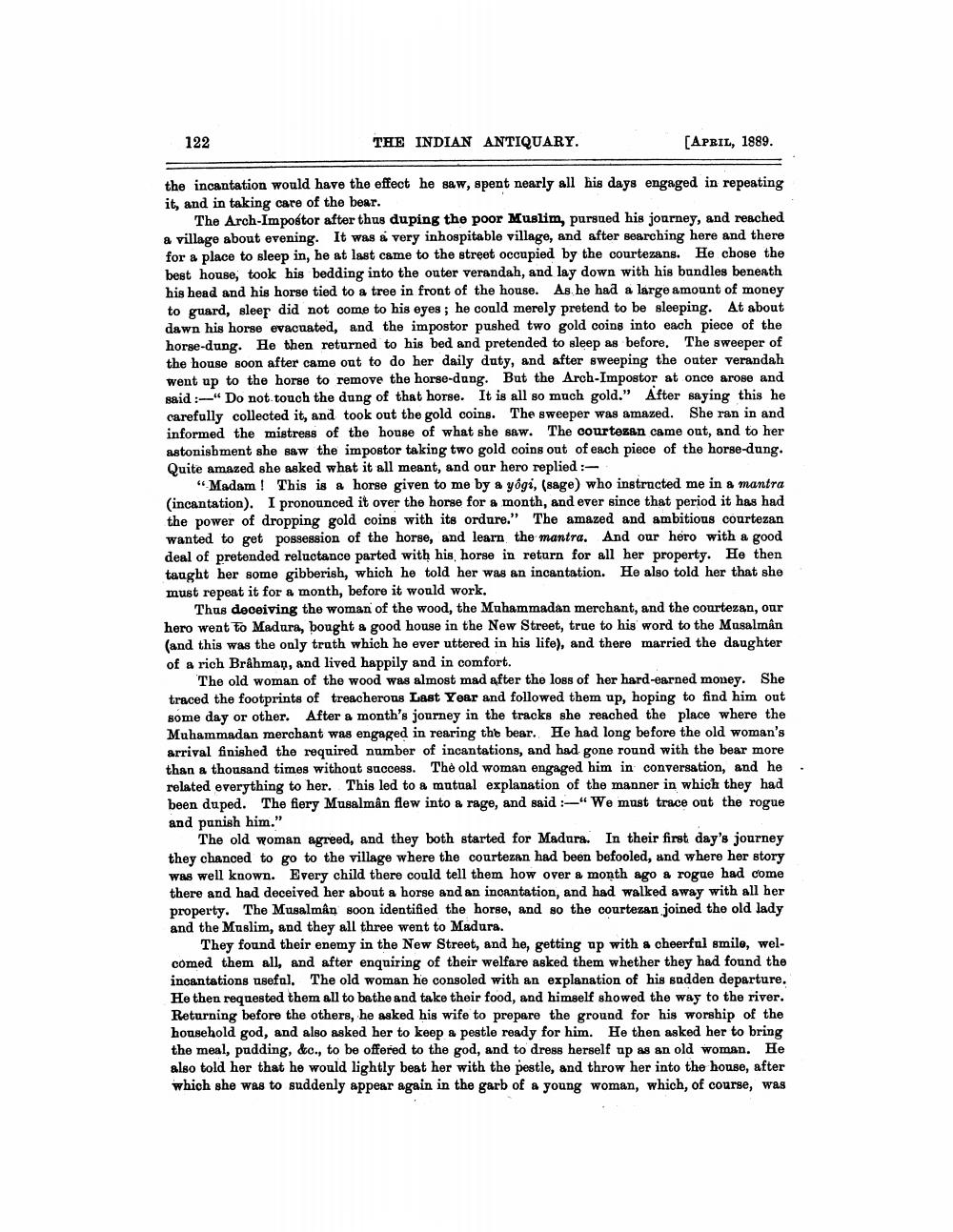________________
122
THE INDIAN ANTIQUARY.
[APRIL, 1889.
the incantation would have the effect he saw, apent nearly all his days engaged in repeating it, and in taking care of the bear.
The Arch-Impostor after thus duping the poor Muslim, pursued his journey, and reached a village about evening. It was a very inhospitable village, and after searching here and there for a place to sleep in, he at last came to the street occupied by the courtezans. He chose the best house, took his bedding into the outer verandah, and lay down with his bandles beneath his head and his horse tied to a tree in front of the house. As he had a large amount of money to guard, sleer did not come to his eyes; he could merely pretend to be sleeping. At about dawn his horse evacuated, and the impostor pushed two gold coins into each piece of the horse-dung. He then returned to his bed and pretended to sleep as before. The sweeper of the house soon after came out to do her daily duty, and after sweeping the outer verandah went up to the horse to remove the horse-dung. But the Arch-Impostor at once arose and said :-"Do not touch the dung of that horse. It is all so much gold." After saying this he carefully collected it, and took out the gold coins. The sweeper was amazed. She ran in and informed the mistress of the house of what she saw. The courtozan came out, and to her astonishment she saw the impostor taking two gold coins out of each piece of the horse-dung. Quite amazed she asked what it all meant, and our hero replied:
"Madam! This is a horse given to me by a yogi, (sage) who instructed me in a mantra (incantation). I pronounced it over the horse for a month, and ever since that period it has had the power of dropping gold coins with its ordure." The amazed and ambitious courtezan wanted to get possession of the horse, and learn the mantra. And our hero with a good deal of pretended reluctance parted with his horse in return for all her property. He then taught her some gibberish, which he told her was an incantation. He also told her that she must repeat it for a month, before it would work.
Thus deceiving the woman of the wood, the Muhammadan merchant, and the courtezan, our hero went to Madura, bought a good house in the New Street, true to his word to the Musalman (and this was the only truth which he ever uttered in his life), and there married the daughter of a rich Brâhman, and lived happily and in comfort.
The old woman of the wood was almost mad after the loss of her hard-earned money. She traced the footprints of treacherons Last Year and followed them up, hoping to find him out some day or other. After a month's journey in the tracks she reached the place where the Muhammadan merchant was engaged in rearing the bear. He had long before the old woman's arrival finished the required number of incantations, and had gone round with the bear more than a thousand times without success. The old woman engaged him in conversation, and he related everything to her. This led to a mutual explanation of the manner in which they had been duped. The fiery Musalmân flew into a rage, and said "We must trace out the rogue and punish him."
The old woman agreed, and they both started for Madura. In their first day's journey they chanced to go to the village where the courtezan had been befooled, and where her story was well known. Every child there could tell them how over a month ago & rogue had come there and had deceived her about a horse and an incantation, and had walked away with all her property. The Musalman soon identified the horse, and so the courtezan joined the old lady and the Muslim, and they all three went to Madura.
They found their enemy in the New Street, and he, getting up with a cheerful smile, wel. comed them all, and after enquiring of their welfare asked them whether they had found the incantations useful. The old woman he consoled with an explanation of his sudden departure. He then requested them all to bathe and take their food, and himself showed the way to the river. Returning before the others, he asked his wife to prepare the ground for his worship of the household god, and also asked her to keep a pestle ready for him. He then asked her to bring the meal, pudding, &c., to be offered to the god, and to dress herself up as an old woman. He also told her that he would lightly beat her with the pestle, and throw her into the house, after which she was to suddenly appear again in the garb of a young woman, which, of course, was




